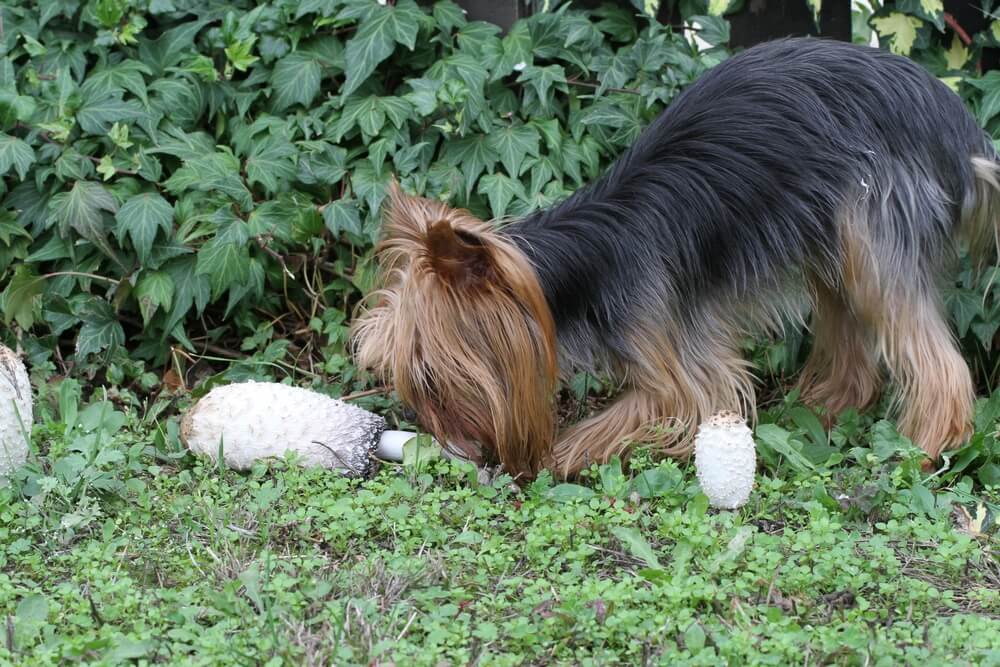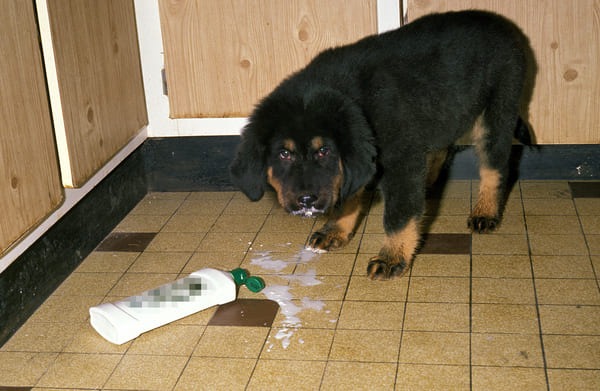
Has My Dog Been Poisoned?
Pet health hazards are all around us and sometimes curious dogs swallow things they shouldn’t. Animalia’s guide offers tips for avoiding poisoning, recognizing the signs, and getting quick veterinary attention.

Health & Science
01/22/2023
6 min read
You keep a watchful eye over your pet, you’ve even puppy-proofed your home, but you can’t be everywhere at once and you can’t always stop a curious dog from sticking their snout where they shouldn’t.
Pet poisoning hazards are all around – in your kitchen, bathrooms, garage, and yard. They’re lying in wait while you’re out on walks and hiding in the foods in your refrigerator. The sheer number of potential toxins out there helps explain why poisoning is one of the most common pet health emergencies. The Animal Pet Poison Control Center has helped manage more than 4 million cases since its founding in 1978.
The severity of canine poisoning symptoms depends mainly on the kind of toxin involved, the quantity that entered the dog’s body, and the method of ingestion. No matter where the poison comes from, it’s crucial that you spot warning signs early to provide for speedy, effective treatment.
How do I know if my dog was poisoned?
Here are some signs and symptoms of toxicity in dogs to look out for. They might indicate a temporary bout of stomach upset or point to a more serious case of poisoning. Either way, you should take them as an indicator that your dog has swallowed something harmful and seek immediate medical care. The sooner a poisoned dog gets to the hospital, the better their chances of making a recovery.

Signs of potential poisoning in dogs
Different types of poisoning manifest themselves with different symptoms. Keep in mind that some symptoms are immediate upon ingestion and others will arise and evolve over time.
- Gastrointestinal issues like vomiting, loss of appetite, diarrhea, excessive salivation, dry heaving, and nausea
- Heavy panting lasting for over 30 minutes
- Wheezing or crackling breathing
- Signs of internal bleeding such as elevated heart rate, very pale gums, vomiting or coughing up blood, bloody stools, weakness or lethargy, and collapsing
- Signs of kidney failure like increased drinking and urination, vomiting, lack of appetite, and diarrhea
- Signs of liver failure, including, strange behavior, yellow gums, lethargy, dark stools, vomiting, diarrhea, or collapsing
Whether or not you’ve seen your dog ingest something unsafe, contact your veterinarian or a pet poisoning emergency hotline immediately. Don’t be afraid to jump the gun. When it comes to your pet’s healthcare, it’s always better to be safe than sorry.
What to do if your dog is poisoned
Quick decision-making is important when pets are poisoned, often literally making the difference between life and death. If you know (or have reason to believe) your dog has eaten something toxic, here are some steps to take:
- Observe your dog’s behavior and watch for warning signs. Make sure their breathing, behavior, and appetite are normal. Sudden aggression, tiredness, disinterest or fearfulness could all potentially indicate poisoning.
- Remove your dog (and other dogs and people) from the area and collect any remaining leaves, roots, flowers or stems, bottles, labels, food, or anything that might help your vet later on. Keep your pet away close by.
- If the poison is on your dog’s fur or in their eyes, wash them and rinse their eyes carefully with clean water.
- Unless your vet gives you specific instructions, don’t give your dog any medication or induce vomiting.
- Phone the Pet Poison Helpline at 855-764-7661, or ASPCA Animal Poison Control at 888-426-4435 immediately for further advice.
- Follow any additional instructions from your vet, including bringing your pet in for treatment.
Diagnosing pet poisoning
Toxins come in several forms. That can make diagnoses challenging when owners can’t say for certain what their dog has ingested. When necessary, a blood work panel may be useful for getting to the bottom of the issue. If your dog vomits, bring a sample of this vomit to your vet. It may contain trace amounts of the ingested substance. Most importantly of all, if you have access to the ingested substance, take it to your veterinarian’s office with you. Having this sample handy will considerably shorten the time your vet will need to make a diagnosis. The earlier your vet determines what exactly, the sooner they can start treating your dog.

Treating pet poisoning
Professionals may administer any of a number of treatments to address your dog’s symptoms and reduce the risk of fatal reactions. Emesis, or vomiting, is the preferred first treatment for most substances. The goal is to encourage pets to regurgitate dangerous toxins before they are absorbed. Unfortunately, this process is a race against the clock. Some substances will absorb faster than others, but in general, toxic material remains in the stomach for approximately 2 hours. During this time, vomiting may be a useful therapy for poisoned dogs. It may grow less effective as more time passes.
In addition to inducing vomiting, vets may administer liquid-activated charcoal. Charcoal binds to the toxic substances and coats the gastrointestinal tract, preventing additional uptake. Poisoned dogs should also receive supportive therapy based on their specific needs and the severity of their symptoms. Supportive care includes intravenous fluids, oxygen supplementation, and pain, heart, or seizure medications as indicated.
How to prevent pet poisoning
The best way to ensure your pet’s safety is to familiarize yourself with potentially harmful substances and do your best to keep your dog away from them and keep them away from your dog. Always lock medicine, detergents, beauty products, DIY supplies, and trash somewhere where prying paws can’t reach. Speaking of paws, dogs can get sick from stepping on toxins too. Think of how often they lick their paws. Sidewalk ice-melts, antifreeze, gasoline, pesticides, weed killers, and garden fertilizers can all be harmful if your dog licks their paws after trekking through a pile or puddle.
Are you prepared for emergency care?
Accidents happen. If your puppy is unlucky enough to encounter a toxin, a good pet insurance policy can help take the headache out of diagnosing and treating them.
Get your quote today and learn more about how you can better provide for the long-term health of your beloved pet.



Get your pet insurance quote
Pet type
- Dog
- Cat
What is your pet's name?
Zip code




